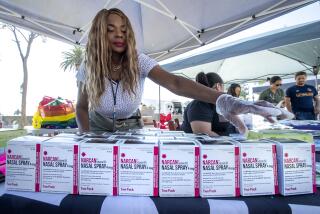California DUI deaths drop to record low
- Share via
The number of alcohol-related fatalities on California highways dropped to a record low last year, with the biggest single-year drop in DUI deaths in 14 years, according to a federal report released Tuesday.
The drop was largely attributable to federally funded anti-drunk driving campaigns, the National Highway Traffic Safety Administration said.
Alcohol contributed to 791 deaths in the state in 2010, a nearly 17% decline from the 950 deaths in 2009.
“Education is the key thing we use to inform the public about the reality and dangers of drunk driving,” said Officer Mike Harris, a public information officer for the California Highway Patrol. “We develop programs and different awareness campaigns. Put all those things together and it’s bound to have an impact.”
Trends show that DUI deaths in the state increased annually from 1998 to 2005 but have decreased every year since then.
Officials attribute the recent sharp decline to an increase in the number of DUI checkpoints, a practice that allow police to stop cars in designated areas in search of drivers under the influence.
In 2010, the federal government beefed up the budget for drunk driving checkpoints. The Office of Traffic Safety allocated $16.8 million in federal funds to law enforcement agencies to conduct 2,553 DUI checkpoints last year, up from the $11.7 million allocated for 1,740 checkpoints in 2009.
In Costa Mesa, police are moving away from DUI checkpoints and toward saturation patrols, which target impaired drivers, both as a cost-saving measure and because of direction from the City Council.
Saturation patrols require half as many police officers as checkpoints and allow officers to respond to emergency calls at other locations. Councilwoman Wendy Leece said it’s a better fit for the recently reduced Police Department.
Chief Tom Gazsi said saturation patrols are more effective for catching drunk drivers, whereas checkpoints are more of an educational service.
Officials said the state endorses many tactics to combat drunk driving, including saturation patrol. However, it prefers DUI checkpoints because of the high deterrence rate, said Chris Cochran, a spokesman for the California Office of Traffic Safety.
“Saturation patrols arrest more drunk drivers,” Cochran said. “DUI checkpoints save more lives. Our end product is to save lives.”
Los Angeles Times staff writer Lauren Williams contributed to this report.
More to Read
Sign up for Essential California
The most important California stories and recommendations in your inbox every morning.
You may occasionally receive promotional content from the Los Angeles Times.











